In recent years, artificial intelligence has fundamentally transformed the sales process, offering tools that streamline workflows, improve customer targeting, and automate routine communication. Sales teams are no longer bogged down by manual data entry or repetitive tasks, allowing them to focus on high-value activities like customer relationship building and deal closure. With AI, businesses can enhance their sales operations by harnessing data-driven insights and hyper-personalized outreach to boost efficiency and effectiveness.
At the forefront of this revolution is the integration of machine learning (ML) and natural language processing (NLP) technologies. These innovations enable businesses to optimize various stages of the sales cycle—from lead generation to customer engagement and pipeline management.
As enterprise startups and venture capital firms like a16z (Andreessen Horowitz) continue to invest heavily in AI-powered sales platforms, it’s clear that the landscape of enterprise sales is rapidly shifting towards automation and intelligence-driven strategies(Learn more about AI’s influence across industries in our AI Augmentation series, covering Customer Experience, Finance, and Marketing).
AI’s ability to analyze vast datasets in real-time helps sales teams refine their targeting and outreach efforts, delivering personalized experiences at scale. For instance, tools like People.ai and Lyzr use AI to sift through customer data, pinpoint high-value leads, and automate the engagement process. This shift allows sales professionals to not only increase their productivity but also enhance customer satisfaction through tailored interactions.
The impact of AI on sales automation is evident in its ability to streamline communication channels as well. By automating emails, follow-ups, and even client conversations, AI-powered tools are driving significant improvements in response rates and conversion metrics.
Sales reps, armed with these intelligent tools, can focus their efforts where it matters most: closing deals. As AI continues to evolve, its role in sales automation is only set to deepen, making it a pivotal force in the future of enterprise sales.
The integration of AI into sales processes has become a pivotal force in transforming how sales teams operate. By leveraging AI tools, sales organizations are enhancing productivity, personalizing customer interactions, and making data-driven decisions with greater accuracy and speed.
Understanding AI in Sales
Benefits of AI for Sales Teams
-
Increased Productivity: AI-powered platforms automate repetitive tasks, such as data entry, lead qualification, and CRM updates. AI tools utilize contact data to enhance lead qualification and CRM updates. Tools like People.ai and Clay streamline the management of customer data and automate processes like scheduling meetings and preparing lead lists. This automation enables sales teams to focus on strategic tasks such as customer engagement and closing deals, significantly boosting overall productivity.
-
Personalized Communication: AI enables hyper-personalized outreach by analyzing large sets of customer data. Tools such as Regie.ai help craft personalized email campaigns and outbound communications tailored to individual customers’ needs, improving engagement and conversion rates. Sales teams can now connect with customers on a more personal level, using insights gathered from AI analytics to refine their messaging and strategies.
-
Data-Driven Decision-Making: AI equips sales professionals with actionable insights derived from vast amounts of data. Tools like Unify and People.ai analyze performance metrics, customer interactions, and sales pipeline health in real-time. These data-driven insights enable sales teams to make informed decisions, optimize strategies, and achieve better results.
The Importance of Automated Sales Workflows
AI not only automates routine tasks but also helps optimize sales workflows. Automation tools streamline processes like CRM updates, lead scoring, and follow-up communication. With solutions like 11x.ai automating outreach and meeting scheduling, sales teams can focus their energy on high-value interactions, such as client meetings and negotiations.
Automated workflows minimize human errors and ensure that sales teams don't miss out on key opportunities. AI agents can manage customer communications across multiple channels, from email to chatbots, ensuring seamless customer experiences at every stage of the sales funnel. This holistic automation not only boosts efficiency but also enhances the quality of customer engagement, providing a competitive advantage to businesses embracing AI.
AI-driven tools are reshaping the sales landscape, empowering teams to work smarter and more efficiently, and allowing them to focus on delivering personalized, high-value interactions.
Sales teams are undergoing a transformation, thanks to the power of AI. By automating mundane tasks, providing real-time data insights, and enhancing customer engagement, AI is driving sales teams to new levels of efficiency and success.
Andreessen Horowitz (a16z) has identified several startups that are leading the charge with cutting-edge AI-powered tools. These companies are fundamentally altering how businesses generate leads, interact with customers, and close deals. Below, we dive into the key players on a16z's radar, each offering unique solutions that elevate the sales process.
CRM Data Analysis
CRM data analysis is a cornerstone of modern sales AI, offering sales teams a treasure trove of actionable insights into customer behavior, preferences, and needs. By leveraging AI to analyze CRM data, businesses can uncover patterns and trends that inform their sales strategies, enhance customer engagement, and drive revenue growth. AI-powered CRM data analysis enables sales professionals to:
-
Identify High-Value Customers: AI can sift through vast amounts of CRM data to pinpoint high-value customers, allowing sales teams to tailor their approach and focus on the most promising leads.
-
Analyze Customer Interactions: By examining customer interactions and sentiment, AI helps sales teams understand what drives customer satisfaction and loyalty, enabling them to refine their engagement strategies.
-
Predict Customer Churn: AI can identify early warning signs of customer churn, allowing sales teams to take proactive measures to retain valuable clients.
-
Optimize Sales Forecasting: With AI, sales teams can improve their sales forecasting accuracy, ensuring better pipeline management and more informed decision-making.
By integrating AI into CRM data analysis, sales teams can gain a deeper understanding of customer behavior, make data-driven decisions, and ultimately drive revenue growth.
Sales Calls and Conversations
Sales calls and conversations are pivotal moments in the sales process, and AI can significantly enhance these interactions. AI-powered sales call analysis provides valuable insights into customer behavior, sentiment, and preferences, enabling sales reps to:
-
Identify Key Moments: AI can highlight critical moments in sales conversations that can influence the outcome of a deal, helping sales reps to focus on what matters most.
-
Develop Personalized Scripts: By analyzing past interactions, AI can help sales reps craft personalized sales scripts and messaging that resonate with individual customers.
-
Improve Sales Pitches: AI provides feedback on sales pitches, helping reps refine their approach and improve their negotiation skills.
-
Enhance Customer Engagement: With AI insights, sales reps can build stronger relationships with customers by addressing their specific needs and concerns more effectively.
By leveraging AI in sales calls, sales reps can optimize their interactions, improve their sales performance, and build lasting customer relationships.
11x
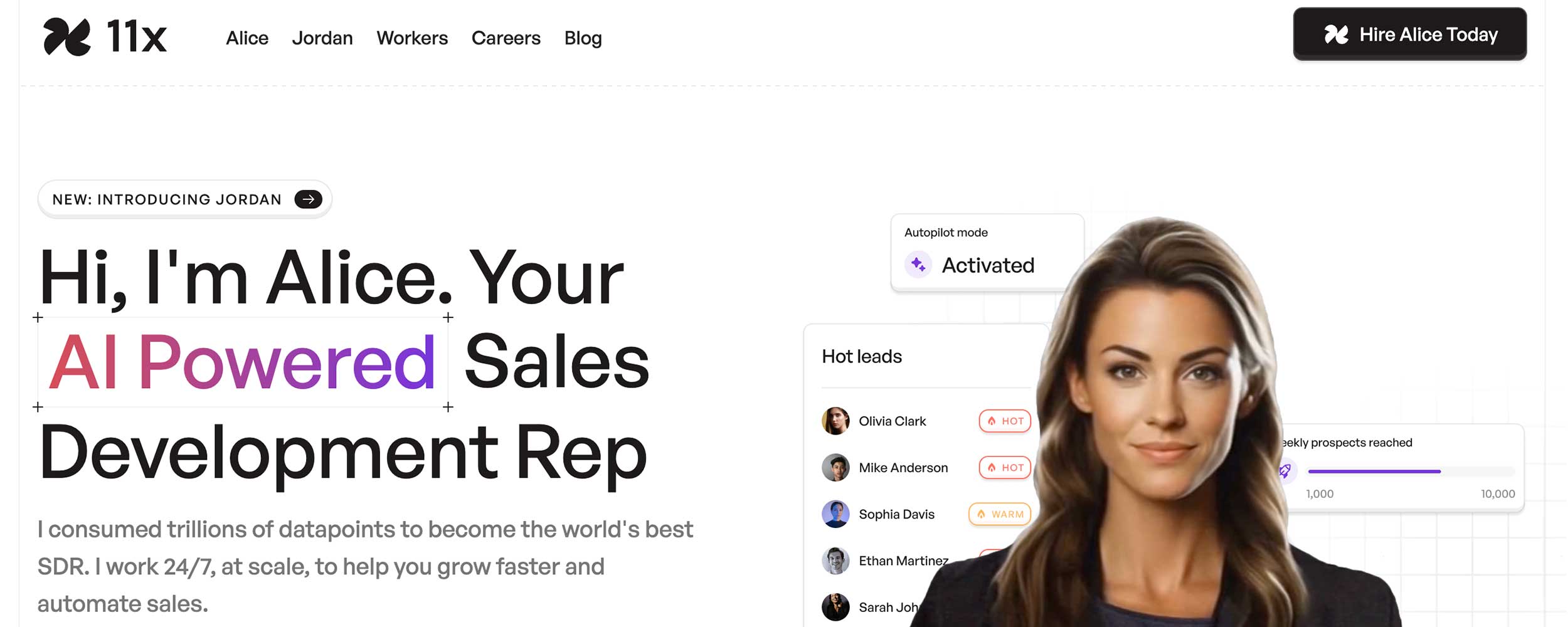
11x is at the forefront of AI-driven automation, offering what it calls a "digital employee." This virtual assistant automates a wide range of repetitive, time-consuming tasks such as scheduling, research, data entry, and follow-ups. By offloading these tasks, sales teams can concentrate on building stronger client relationships and strategizing deal-closing techniques. The recent $24 million funding round, led by Benchmark, underscores the market's confidence in 11x's ability to revolutionize sales workflows.
Actively AI
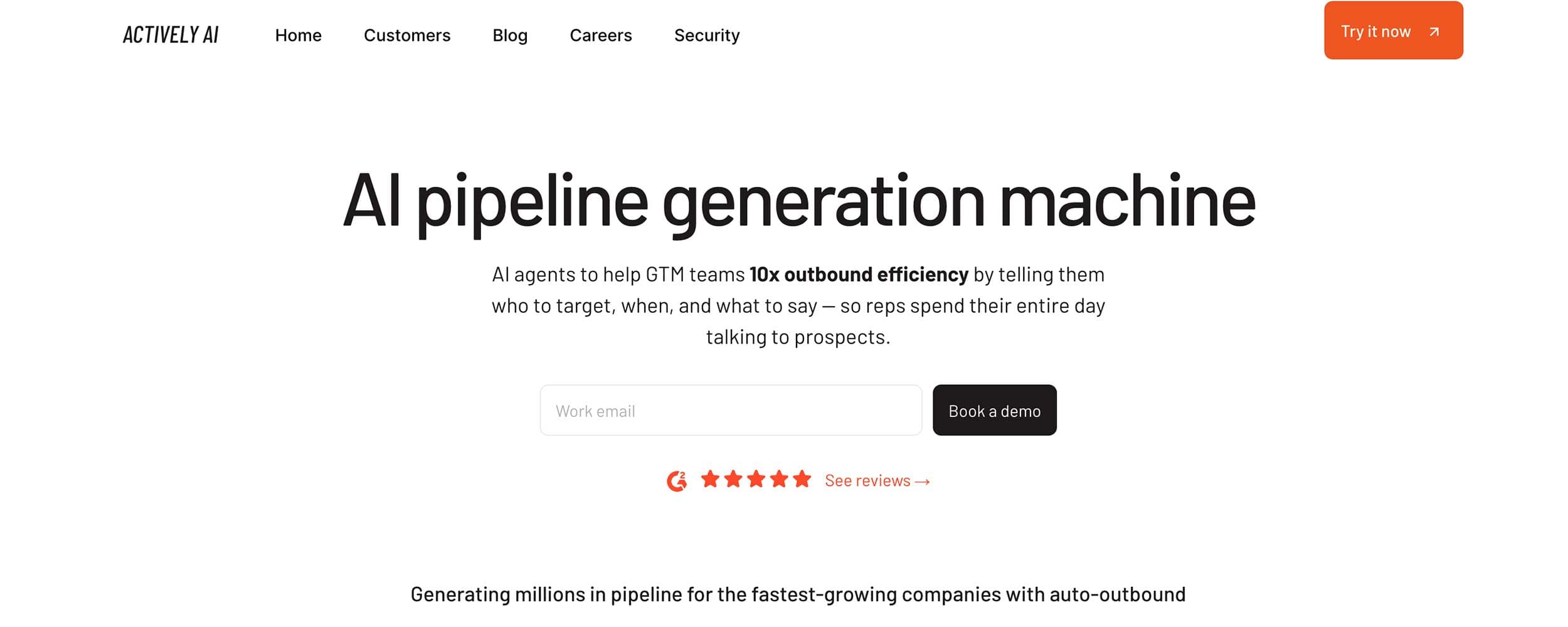
Actively AI takes personalization to the next level by analyzing customer data in real-time to fine-tune outreach strategies. The platform identifies patterns in customer behavior, ensuring that each communication is highly relevant and tailored to the prospect's needs. This level of hyper-personalization drives engagement, improving the chances of conversions.
AiSDR
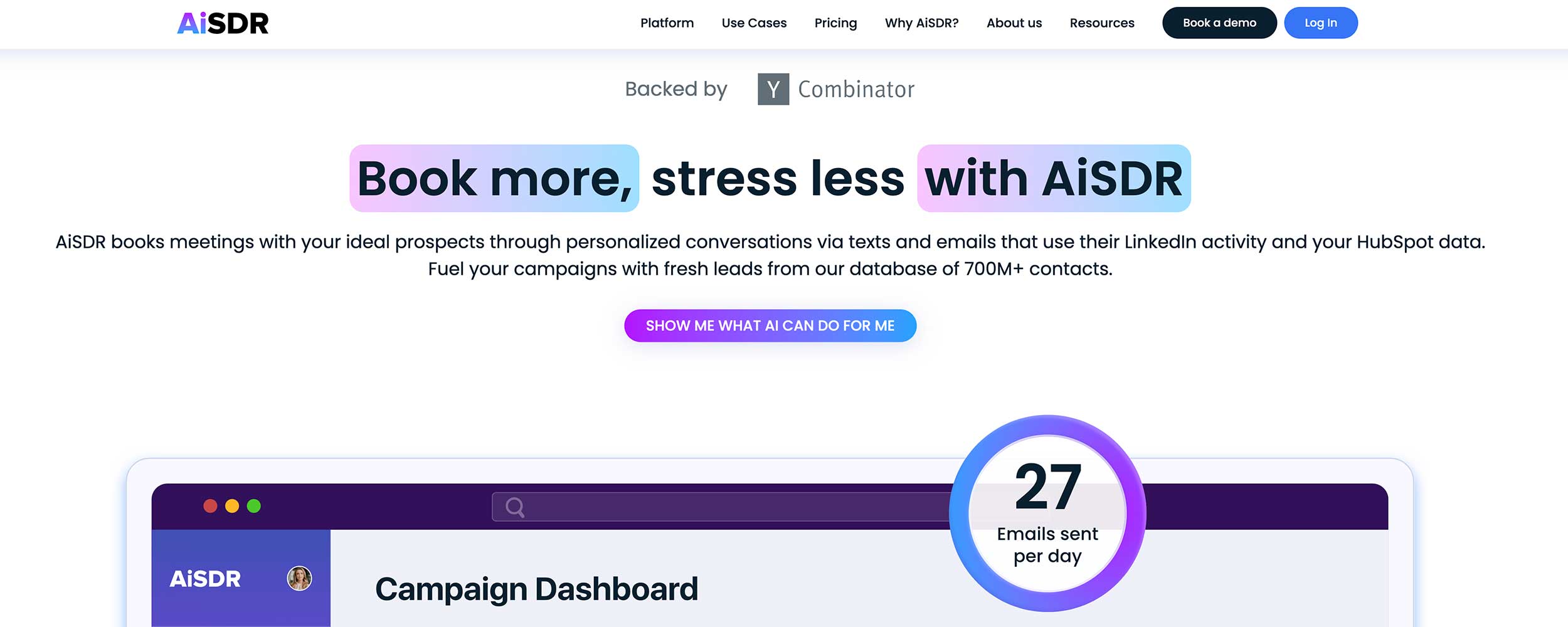
AiSDR focuses on the early stages of the sales funnel, automating tasks typically handled by Sales Development Representatives (SDRs). These include lead identification, qualification, outreach, and follow-up—tasks that, while essential, are often repetitive and time-consuming. AiSDR's AI engine scours through large datasets to identify high-potential leads, automates initial communication, and ensures follow-up happens at the optimal times.
Clay
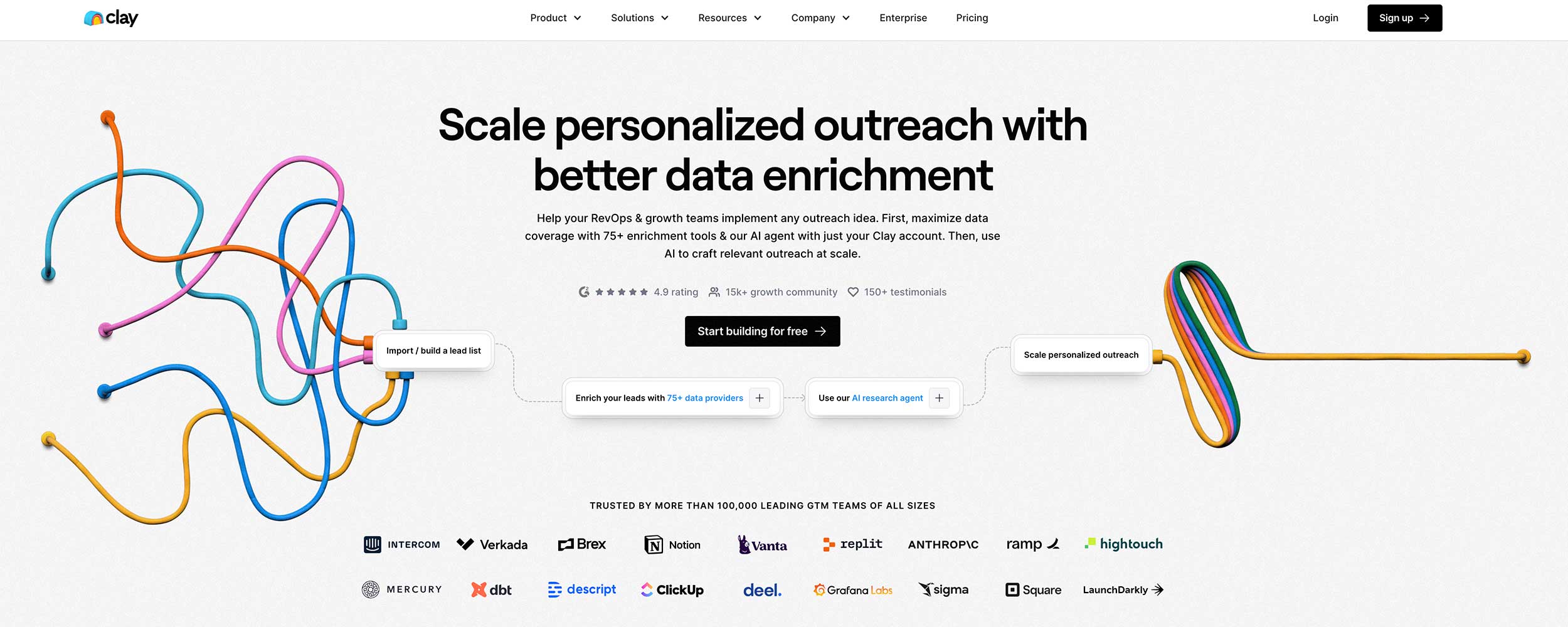
Clay is designed to enhance lead generation through real-time data collection and enrichment. The platform uses AI to scrape data from across the web and other sources to build detailed profiles of potential leads. Sales teams can then use this enriched data to prioritize high-value prospects and tailor their outreach more effectively.
Lyzr
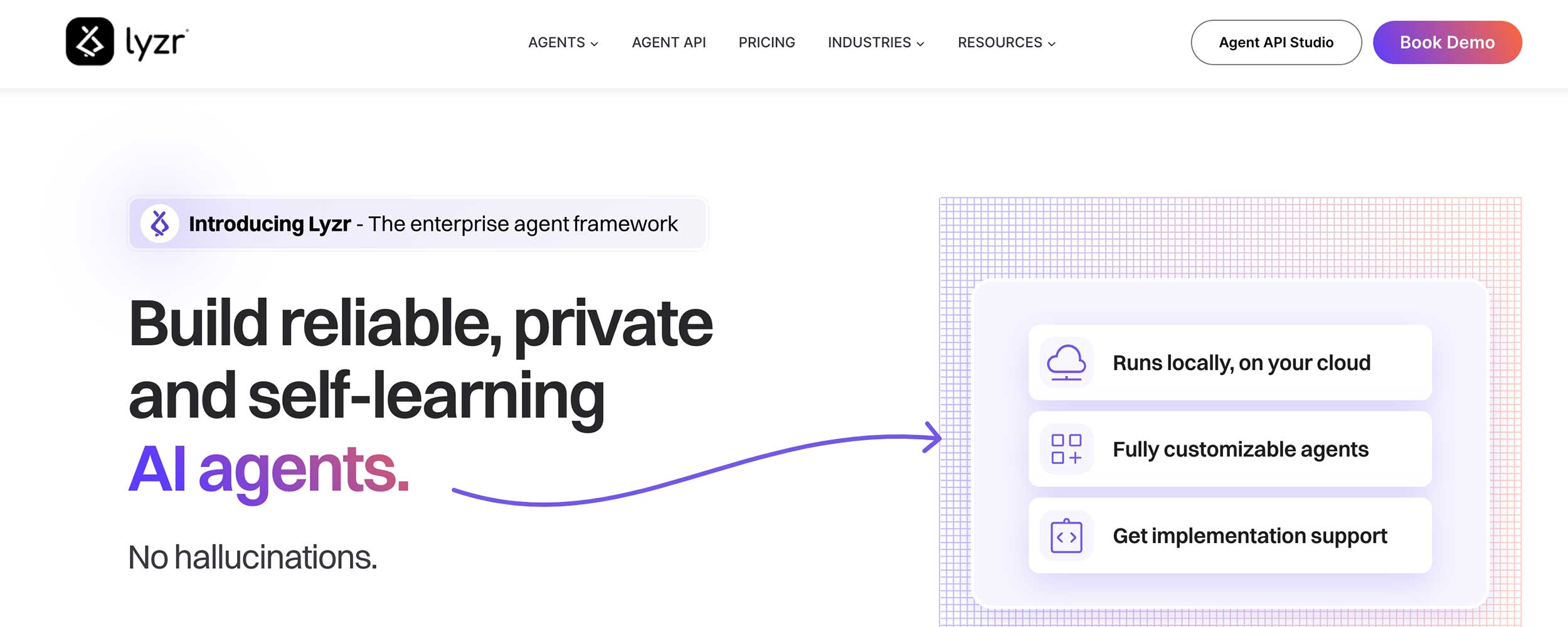
Lyzr leverages advanced machine learning algorithms to provide deep insights into customer behavior and preferences. By analyzing data points like browsing history, purchasing patterns, and interaction touchpoints, Lyzr helps sales teams refine their pitches and customize their approach to each prospect.
OneShot
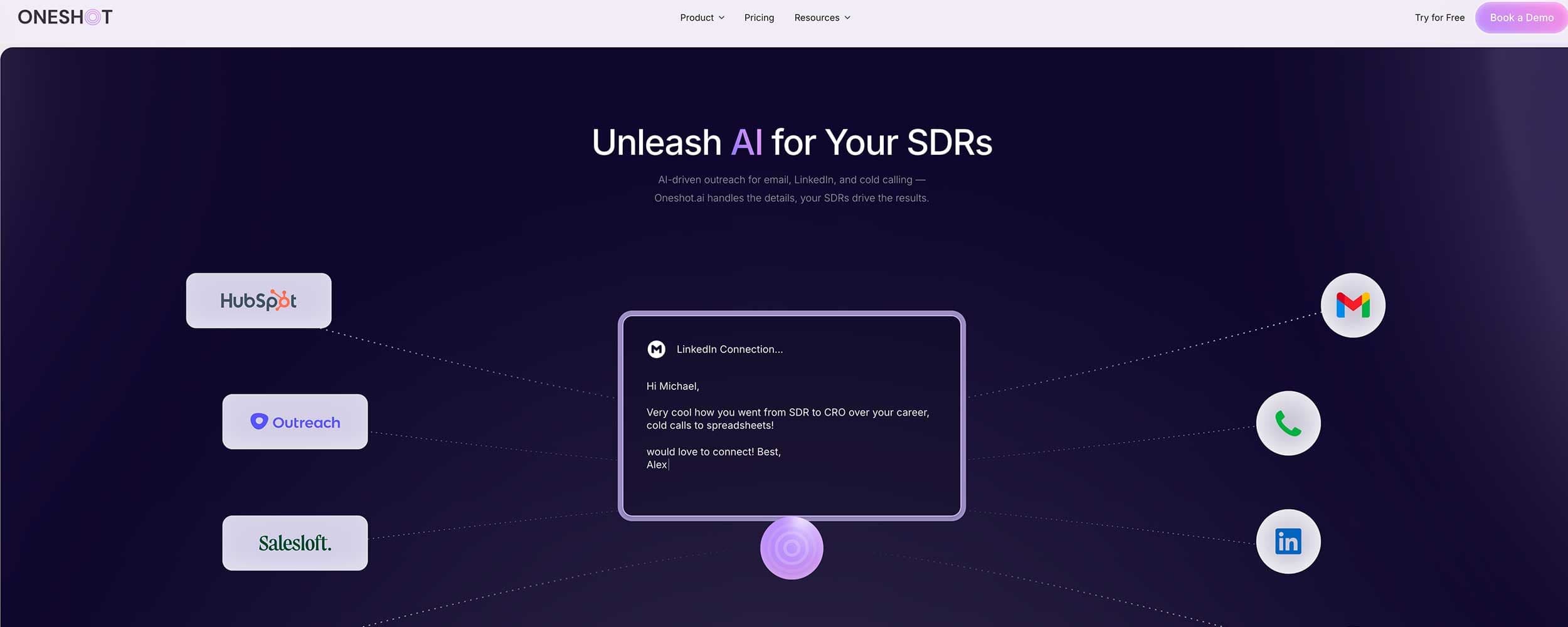
OneShot is focused on automating sales messaging with a high degree of personalization. The platform generates customized outreach emails and follow-up sequences based on customer data, ensuring that each message feels tailored to the recipient. OneShot's AI also tracks customer responses and adapts the messaging strategy accordingly, keeping the conversation moving forward and increasing the chances of a successful outcome.
People.ai
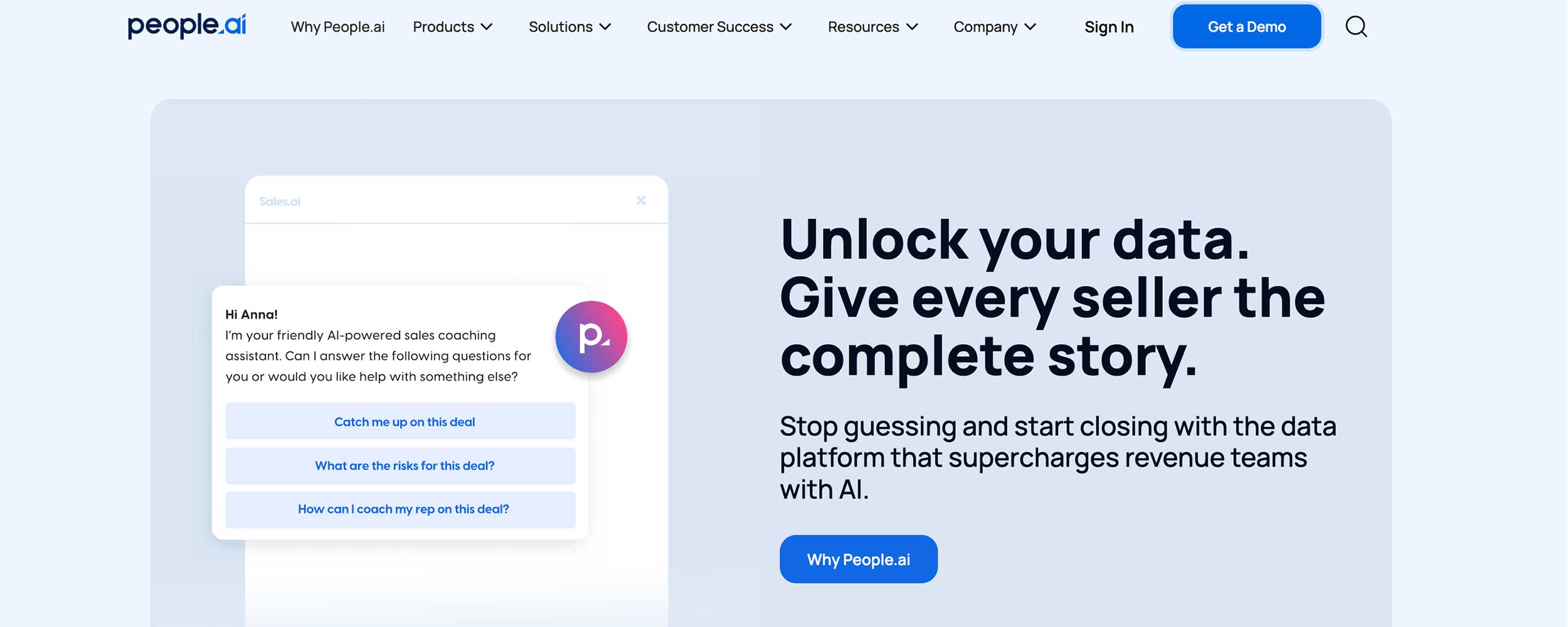
People.ai offers a powerful AI-driven analytics platform that captures data from emails, CRM systems, and phone calls to provide sales teams with actionable insights. The platform not only tracks and records interactions across various communication channels but also analyzes the data to identify trends and patterns that can inform sales strategies.
Regie.ai
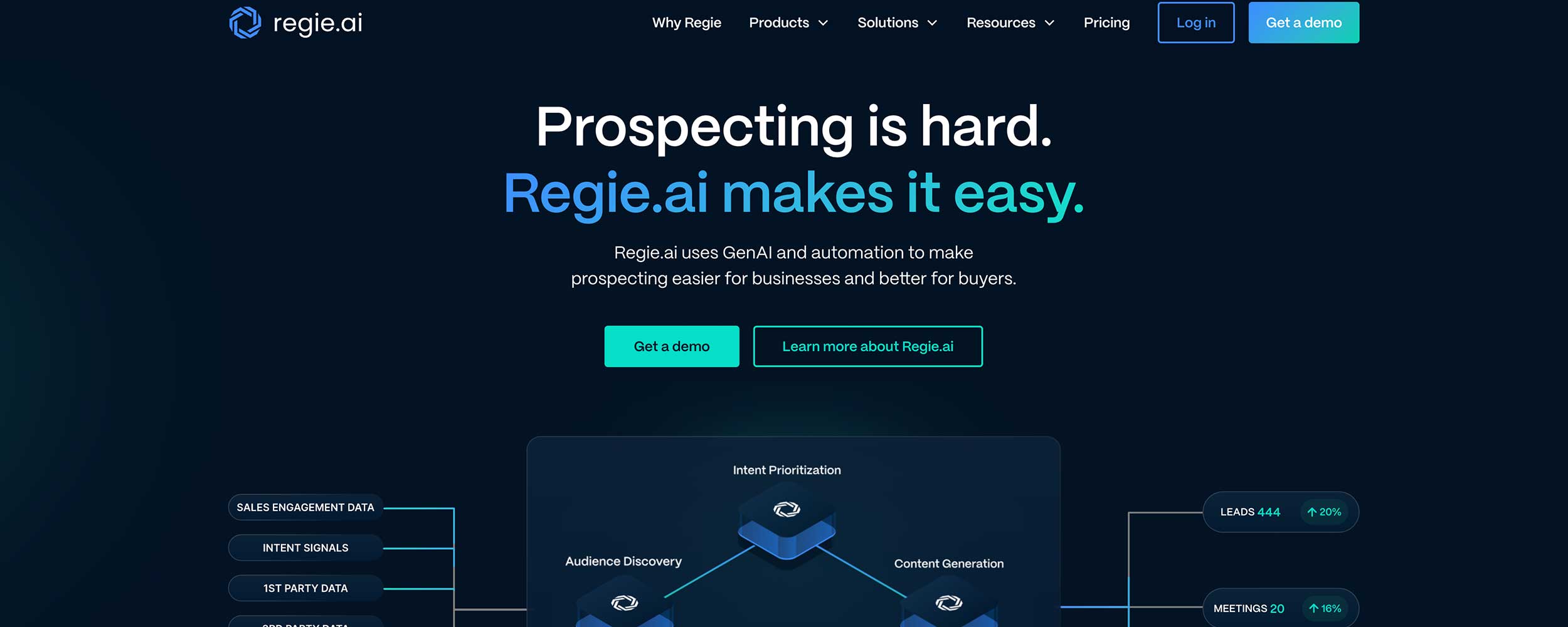
Regie.ai is a content automation platform designed for outbound sales teams, allowing them to generate personalized marketing and sales copy at scale. By leveraging AI to create tailored email sequences and campaign materials, Regie.ai enables sales teams to engage more effectively with potential customers.
Unify
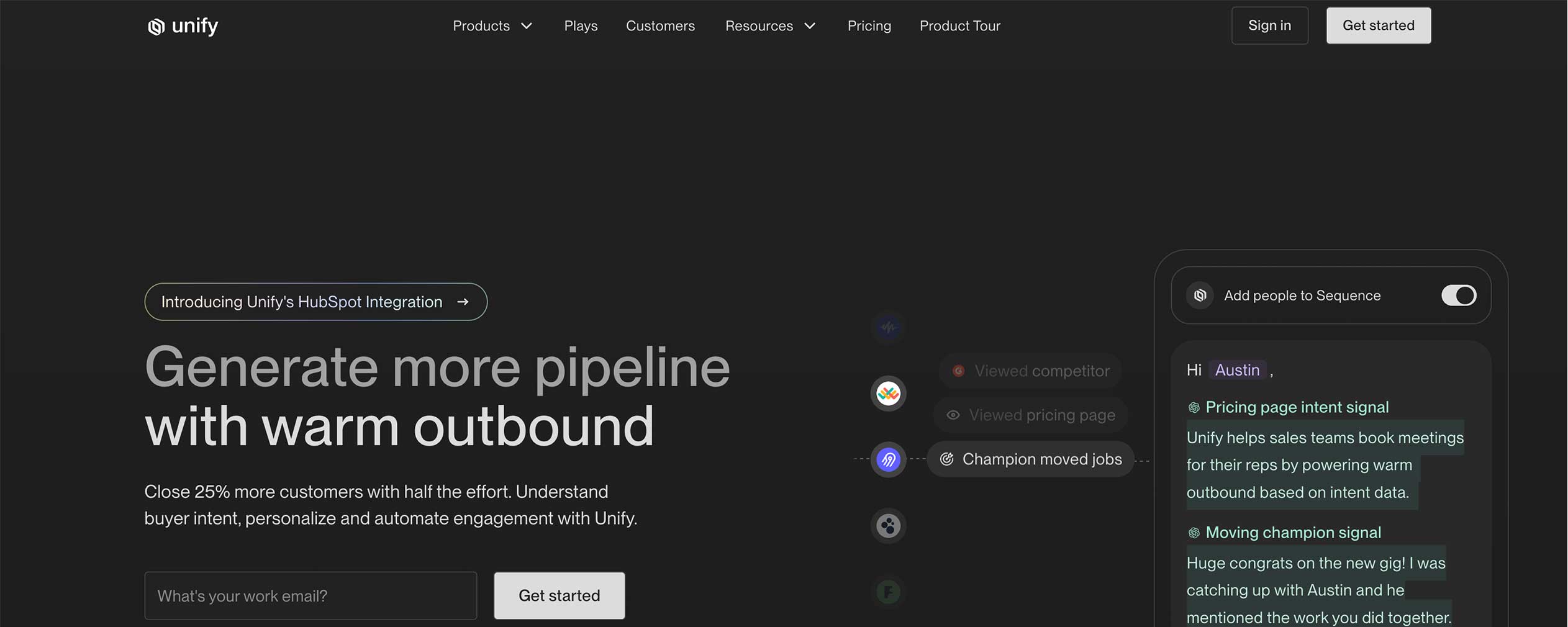
Unify simplifies pipeline management and CRM integration through AI-driven automation. The platform integrates with existing sales tools to automate key workflows, such as lead tracking, opportunity management, and customer nurturing. By reducing the manual effort required to manage sales pipelines, Unify ensures that no opportunity slips through the cracks.
The AI-powered tools developed by these startups are fundamentally changing how sales teams operate. From automating routine tasks to providing deep customer insights, these tools are helping companies improve their efficiency, enhance customer engagement, and ultimately drive revenue growth. As AI technology continues to evolve, these platforms will become even more indispensable, offering more sophisticated ways to optimize sales processes and stay ahead in an increasingly competitive market.
Implementing AI in Sales
Building a Strong Sales AI Strategy
Building a robust sales AI strategy is essential for maximizing the benefits of AI in sales. To create an effective strategy, businesses should:
-
Define Clear Objectives: Establish specific sales objectives and key performance indicators (KPIs) to measure the success of AI initiatives.
-
Choose the Right Tools: Select AI tools and platforms that align with the company’s sales goals and can be seamlessly integrated into the existing tech stack.
-
Integrate with Existing Systems: Ensure that AI tools are compatible with existing CRM, sales automation, and marketing systems to create a cohesive sales ecosystem.
-
Provide Training and Support: Offer ongoing training and support to sales reps to ensure they can effectively use AI tools and understand their benefits.
-
Monitor and Evaluate: Continuously monitor the effectiveness of the sales AI strategy, gather feedback, and make necessary adjustments to optimize performance.
By following these best practices, businesses can unlock the full potential of sales AI, driving revenue growth, improving customer satisfaction, and staying ahead of the competition.
Future Outlook: The Future of AI in Sales Forecasting
The future of sales is increasingly intertwined with advancements in AI. As AI technologies continue to evolve, the sales process will become more intelligent, automated, and personalized than ever before. Sales teams are already witnessing the benefits of AI, but the next wave of innovations promises even deeper integration of AI across all facets of the sales cycle—from lead generation to deal closure.
One of the most significant future trends is the rise of generative AI in sales. Tools powered by this technology will not only automate data analysis but also predict buyer behavior and generate hyper-personalized outreach materials. For example, platforms like Regie.ai are pushing the boundaries of automated content generation, making it possible for sales teams to scale their outreach efforts without compromising on personalization.
Another trend to watch is AI's role in predictive sales analytics. Companies like People.ai are already leveraging machine learning to provide actionable insights into sales performance. As AI models improve, sales teams will be able to anticipate market shifts, customer needs, and even potential risks with greater accuracy.
Moreover, the integration of AI-powered conversational agents is expected to play a larger role in customer engagement. These agents, which utilize natural language processing (NLP), will handle initial customer inquiries, leaving sales reps to focus on more complex interactions. Platforms such as OneShot are leading the way by automating email communication and follow-ups, ensuring that potential leads are never lost due to a lack of timely responses.
AI Adoption Success Stories
Several companies have already successfully integrated AI into their sales processes, achieving impressive results. Verkada, a customer of Actively AI, has leveraged AI to personalize its outreach strategy. By analyzing customer data, Actively AI enables Verkada's sales team to craft tailored messages that resonate with specific segments, leading to higher engagement rates and a more efficient sales cycle.
Pylon, another company that adopted Unify's AI-driven platform, has streamlined its pipeline management. The integration of Unify allowed Pylon's sales team to automate lead tracking and CRM updates, drastically reducing administrative burdens. This shift has contributed to a 20% increase in pipeline efficiency and a notable reduction in the average time to close deals.
Additionally, 11x has shown that AI can extend beyond traditional sales tasks into more advanced "digital employee" roles. By using AI to manage scheduling, reporting, and other routine tasks, 11x's customers have been able to scale their sales operations without needing to expand their teams significantly.
These case studies demonstrate the transformative power of AI in sales. From improving lead generation to enhancing customer interactions, AI is enabling businesses to optimize every step of the sales process. As more companies adopt AI technologies, the competitive landscape of sales will shift towards those that can most effectively leverage AI to drive results.
Why AI is Transforming Sales
The integration of AI into the sales process is more than just an upgrade—it's a paradigm shift that redefines how businesses approach lead generation, customer engagement, and deal closure. At its core, AI offers sales teams the ability to automate repetitive tasks, personalize customer interactions, and make data-driven decisions with unprecedented accuracy.
One of the key reasons why AI is becoming indispensable to sales teams is its ability to boost productivity. Tools like 11x and Actively AI eliminate time-consuming administrative work, enabling teams to dedicate more time to selling and less to manual processes.
By automating lead scoring, follow-ups, and email campaigns, AI significantly shortens the sales cycle and reduces the risk of human error, making the entire process more efficient.
Another critical factor is personalization at scale. AI-powered platforms like Regie.ai and OneShot allow businesses to craft highly personalized messages for each prospect based on their behavior and preferences, all while maintaining the ability to scale outreach efforts.
This level of tailored engagement not only increases customer satisfaction but also boosts conversion rates, as customers feel more understood and valued.
AI also transforms sales by enhancing decision-making. Tools like People.ai and Lyzr analyze customer interactions and provide sales teams with real-time insights, helping them identify the most promising leads and tailor their strategies accordingly. With AI-driven analytics, sales professionals can make informed decisions that directly influence their ability to close deals faster and more effectively.
Looking ahead, the future of AI in sales is promising. The continued advancement of machine learning algorithms and predictive analytics will enable even greater personalization, while conversational AI agents will take on more complex customer interactions.
Companies that have already embraced AI, such as Verkada and Pylon, have reported significant improvements in sales efficiency, pipeline management, and overall revenue growth, proving that AI is not just a trend but a long-term solution that reshapes the competitive landscape.
In conclusion, AI is not merely augmenting sales—it is fundamentally transforming it. As businesses continue to adopt these technologies, the gap between AI-enabled sales teams and those relying on traditional methods will only widen. The future of sales belongs to those who can harness AI's full potential, ensuring that they remain agile, data-driven, and customer-centric in an increasingly competitive market.
References
- a16z | Vertical SaaS with AI Inside
- Actively AI | Verkada Case Study
- AiSDR | AiSDR Platform
- Clay | AI Sales Prospecting
- Lyzr.ai | Jazon
- OneShot | AI-Powered Messaging
- People.ai | Why People.ai
- TechCrunch | Regie secures $10M to generate marketing copy using AI
- TechCrunch | AI digital employee startup 11x.ai raises $24M led by Benchmark
- Unify | Pylon Case Study
- Giselle | Vertical AI : Shaping Industry-Specific Solutions for the Future
- Giselle | AI in Content Creation: Innovations, Challenges, and What’s Next
- Giselle | Generative AI: Unlocking the Future of Business Productivity and Economic Growth
- Giselle | Redefining SaaS Economics: How AI is Transforming Pricing Strategies
Please Note: This content was created with AI assistance. While we strive for accuracy, the information provided may not always be current or complete. We periodically update our articles, but recent developments may not be reflected immediately. This material is intended for general informational purposes and should not be considered as professional advice. We do not assume liability for any inaccuracies or omissions. For critical matters, please consult authoritative sources or relevant experts. We appreciate your understanding.
